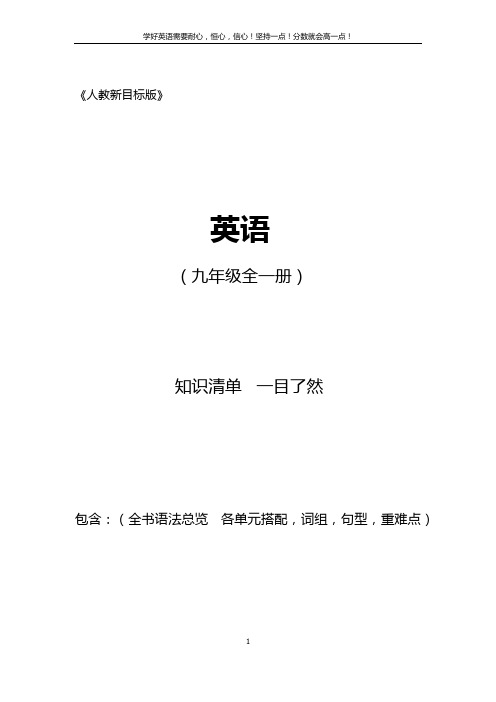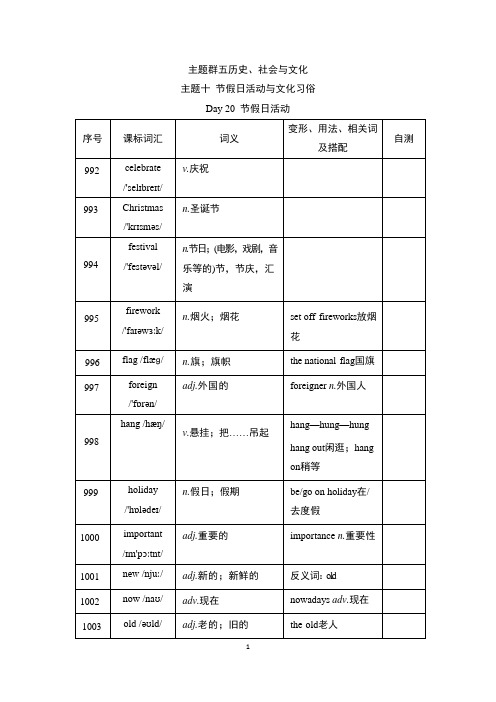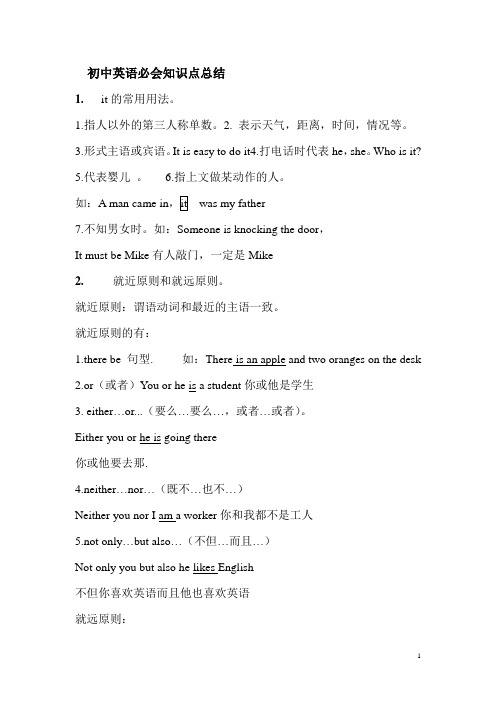新课标九年级英语知识点总复习
人教九年级全一册英语期末考试复习知识点总结(全)

《人教新目标版》英语(九年级全一册)知识清单一目了然包含:(全书语法总览各单元搭配,词组,句型,重难点)教你几个常用的英语期末考试技巧不管期末还是中考,很有用哦!1、当看到选项中有课本上本单元重点语法时,一般会选择该选项,比如说U1学的by ,那么看到期末考试开始的介词时优选选By(中考不一定)2、介词+doing 大家都知道,但是考试的时候出现了介词,你知道这个是介词吗?如果你知道,不管啥意思,后面选doing3、阅读中都会有潜规则的小顺序问题,对号入座即可,还有,很多选项确实不知道选择什么时,一定要记住——优先选择正能量,拒绝太绝对4、当看到生词时候,我们很多时候都是想去蒙一下,但是为什么不用排除法呢,那样正确率会很高,为啥会有生词——因为出题人想让你——懵!5、词语运用很多时候我们比较害怕那些首字母或者盲填项,但是你有没有发现这些空都是一个小规律——介、冠、连、代!正确率90%,不信你试试!6、我们写作文都想得高分,但是你知道看卷子的老师把大部分时间都放在哪里吗?——开头与结尾,你的开头很精彩吗?不会又是hello ,everyone ,my name is……吧?来几个漂亮的高级句型,多漂亮,多精彩!多学学吧!人教新目标九年级教科书细节知识点目录总览Unit 1 How can we become good learners?本单元主要语法点1.以 by为代表的介词用法2. 介词+V. ing和介词+宾格用法Unit 2 I think that mooncakes are delicious!本单元主要语法点1. that, if, whether及其他疑问词引导的简单宾语从句2. What 和How引导的感叹句Unit 3 Could you please tell me where the restrooms are?本单元主要语法点1. 情态动词用法汇总复习2.宾语从句的深入用法Unit 4 I used to be afraid of the dark.本单元主要语法点1. used to的用法2. 现在完成时,一般过去时复习Unit 5 What are the shirts made of?一般现在时的被动语态Unit 6 When was it invented?本单元主要语法点一般过去时的被动语态Unit 7 Teenagers should be allowed to choose their own clothes.本单元主要语法点含情态动词的被动语态的用法Unit 8 It must belong to Carla.本单元主要语法点must, might, could和can’t为代表的情态动词表推测Unit 9 I like music that I can dance to.本单元主要语法点定语从句的用法Unit 10 You’re supposed to shake hands.本单元主要语法点1. be supposed/expected to do2. It’s + adj. + for sb to do sth3. If 从句,被动语态,状语从句复习Unit 11 Sad movies make me cry.本单元主要语法点1. make sb do sth等接不带to的不定式作宾补的短语2. make sb + adj等结构用法3. 被动语态复习Unit 12 Life is full of the unexpected.本单元主要语法点1. 过去完成时(非中考考点)2. 一般过去时复习Unit 13 We’re trying to save the earth!本单元主要语法点1.情态动词2.used to 用法3. 现在进行时、现在完成时、被动语态等复习Unit 14 I remember meeting all of you in Grade 7.本单元主要语法点1.宾语从句2. 一般将来时3.动名词的用法Unit 1 How can we become good learners?【必背短语】1.finish doing sth 完成做某事2.fell in love with sb /sth 爱上某人/某事1. have conversation with sb. 同某人谈话2. too…to… 太……而不能3. the secret to… ……的秘诀4. be afraid of doing sth./ be afraid to do sth. 害怕做某事5. look up 查阅6. repeat out loud 大声跟读7. make mistakes in 在……方面犯错误8. connect ……with… 把……和……连接/联系起来9. get bored 感到厌烦10. be stressed out 焦虑不安的11. pay attention to 注意;关注12. depend on 取决于;依靠13. the ability to do sth.. 做某事的能力【细节知识点】1.Just read quickly to get the main ideas这句话中to get 是动词不定式做目的状语,这种用法大家一定要注意2.everyone is born with the ability to learnbe born with 出声这句话之中to learn 是动词不定式做定语,修饰前面的名词ability3.by + doing :通过……方式其实不光是by,而且很多介词后面都要用名词形式,大家一定要记住这个规则!4. talk about 谈论,议论,讨论talk to sb= talk with sb 与某人说话5. a lot 许多 ,常用于句末表示强调。
初中英语中考复习 中考英语(人教新课标)一轮复习教案:九年级全册Unit 11-14

第30课时课题:9年级(U11-14)一、目标:1. 能运用“使役动词make ”带“去to 不定式”和形容词作“宾语补足语”的基本用法;2. 能理解“过去完成时态”的基本用法;3. 识记下列重点单词和短语:(U11)drive, examine, weight, courage, agreement, drive sb. mad, the more …the more, be friends/f riendly with sb., neither...nor …, to start/begin with, be hard on sb./be strict with sb.; (U12) backpack, ring, worker, above, alive, airport, till/until, west, market, fool, lady, officer, by the time …, give sb. a lift, in line with, show up, by the end of, sell out; (U13)bottom, coal, ugly, advantage, cost, gate, bottle, president, be harmful to, at the top of, turn off, pay for, take action, throw away, bring back; (U14) survey, row, keyboard, double, shall, ours, senior, text, manager, gentleman, congratulate, thirsty, look back at, go by, first of all, be thankful to sb., ah ead of, along with, set out二、重点:1. “动词不定式一般式to + v .”作“宾语补足语”时带不带“to ”的用法;2. 理解“过去完成时态”表示 “过去的过去”的用法:三、知识梳理:1. 词汇:(1)职业名称: 演员 主席/女主席 厨师 导演 医生 司机 农夫 actor chairman/-womancook director doctor driver farmer 领导 主人/师傅 经理 军官 物主乘客先锋 leader master manager officer owner passenger pioneer 邮递员警察/女警察总统/校长 囚犯 学生 科学家 秘书 postman policeman/-woman president prisoner pupil scientist secretary士兵 陌生人 学生 老师 侍者 工人soldierstrangerstudentteacherwaiterworker地址 机场 区域 军队 澡堂卧室建筑物addressairportareaarmybathroom bedroom building中考一轮 复习教学参考资料2. 句型与语法:(1)使役动词make的两个用法:五、巩固练习:(一)词汇练习(略)1.英汉互译下列单词:(1)职业名称:士兵老师侍者工人stranger student(2)最常用表“处所”的名词:卧室address airport area army bathroom building 首都电影院教室ceiling coast college company国家农场concert corner countryside floor gym 医院湖泊陆地图书馆heaven kitchen lab(oratory)会议博物馆办公室公园market nature palace运动场餐馆河流房间学校place pond剧院村庄世界动物园supermarket toilet university(3)表示“感觉、感情”方面的形容词:生气的兴奋的angry crazy excited glad happy interested 紧张的有病mad nice patient surprisedexamine(v.)→_____________(n.) comfortable(adj.) →_____(反义形容词) weight(n.) →_____________(v.) agree(v.) →____________________(v.) expect(v.) →____________(adj.) →_______________(反义形容词)work(n. & v.) →__________(n.) discovery(n.) →_________________(v.) alive(adj.) →________(v.) →______(-ly形式adj.) →______(-ing形式adj.) believable(adj.) →_________(v.) disappear(v.) →____________(反义词) wooden(adj.) →___________(n.) advantage(n.) →____________(反义词)scientific(adj.) →__________(n.) congratulate(v.) →______________(n.)thank(n.) →_____________(adj.) ahead(adv.) →_________________(n.)(二)语法练习1. 语法填空:(1) A: What ______(make) you angry?B: When people throw rubbish on the streets, it makes me ______(anger).C: Me, too. It takes me ______(want) to tell them clean up the streets.(2) I was made ______(cry) by sad movies.(3) _____ the time Mary ____(get) up, Tim had already gone into the bathroom.(4) ____ dinner time, I had already remembered all the news words of the class.(5) A: The river was so dirty. Even the river bottom _____(be) full of rubbish.B: But it ____(use) to be clean!A: Yes, but people _______(throw) litter(垃圾) into the river.B: So I think everyone in the town should _____(help) (to) clean up the river.(6) I ____(be) about to go to school ____ I found that I had left my homework in my bedroom.(7) As I ___________ (talk) with my classmates, I saw our math coming into the classroom.2. 将下列句子译成汉语:(1) When he put the noodles into a bowl, he realized that he had forgotten to add the green beans. __________________________________________________(2) Before she got a chance to say goodbye, he had got into the building.________________________________________________________3. 用英语回答下列问题:(1) What do you remember about Grade 7?________________________________________________________(2) What happened in Grade 8 that was special?________________________________________________________(3) What did you use to do that you don’t do now?________________________________________________________(4) How have you changed since you started junior high school?________________________________________________________(5) How do you think things will be different in senior high school?________________________________________________________(6) What are your plans for next year?________________________________________________________(7) What are you looking forward to?________________________________________________________(三)综合练习1. 听下面的独白,从每小题中所给的A、B、C三个选项中选出符合对话内容的最佳选项。
2025年外研版中考英语总复习新课标词汇分类复习主题十 节假日活动与文化习俗

recent /'riːsnt/
adj.最近的
recentlyadv.最近
1020
recognise=recognize
/'rekəɡnaɪz/
v.认出;承认;认可;识别
1021
send /send/
v.邮寄;发送;派遣
send—sent——sent
sendsb.sth.=sendsth.tosb.发送/邮寄某物给某人
1009
folk /fəʊk/
adj.民间的;民俗的
folkmusic民俗音乐
1010
full /fʊl/
adj.满的;充满的:完全的
be full of=befilledwith充满
1011
great /ɡreɪt/
adj.伟大的;美妙的adv.极好地
greatlyadv.很;非常
1012
hometown /'həʊmtaʊn/
n.灯笼
theLanternFestival元宵节
1017
necessary /'nesəsəri/
adj.必需的;必要的
necessarilyadv.必要地
1018
past /pɑːst/
adv.经过adj.过去的prep.在……之后
n.过去;昔日;往事
inthe past在过去go/walk past经过
主题群五历史、社会与文化
主题十节假日活动与文化习俗
Day 20节假日活动
序号
课标词汇
词义
变形、用法、相关词及搭配
自测
992
celebrate /'selɪbreɪt/
v.庆祝
新目标九年级英语语法汇总强力推荐 新课标

1. by + doing 通过……方式如:by studying with a groupby 还可以表示:“在…旁”、“靠近”、“在…期间”、“用、“经过”、“乘车”等如:I live by the river.I have to go back by ten o’clock.The thief entered the room by the window.The student went to park by bus.2. talk about 谈论,议论,讨论如:The students often talk about movie after class.学生们常常在课后讨论电影。
talk to sb. =talk with sb. 与某人说话3. 提建议的句子:①What/ how about +doing sth.?如:What/ How about going shopping?②Why don’t you + do sth.? 如:Why don’t you go shopping?③Why not + do sth. ? 如:Why not go shopping?④Let’s + do sth. 如:Let’s go shopping⑤Shall we/ I + do sth.? 如:Shall we/ I go hopping?4. a lot 许多常用于句末如:I eat a lot. 我吃了许多。
5. too…to 太…而不能常用的句型too+adj./adv. + to do sth.如:I’m too tired to say anything. 我太累了,什么都不想说。
6. aloud, loud与loudly的用法三个词都与"大声"或"响亮"有关。
①aloud是副词,重点在出声能让人听见,但声音不一定很大,常用在读书或说话上。
强力推荐 新课标初中英语必会知识点总结

初中英语必会知识点总结1. it的常用用法。
1.指人以外的第三人称单数。
2. 表示天气,距离,时间,情况等。
3.形式主语或宾语。
It is easy to do it4.打电话时代表he,she。
Who is it?5.代表婴儿。
6.指上文做某动作的人。
如:A man came in,it was my father7.不知男女时。
如:Someone is knocking the door,It must be Mike有人敲门,一定是Mike2. 就近原则和就远原则。
就近原则:谓语动词和最近的主语一致。
就近原则的有:1.there be 句型. 如:There is an apple and two oranges on the desk2.or(或者)You or he is a student你或他是学生3. either…or...(要么…要么…,或者…或者)。
Either you or he is going there你或他要去那.4.neither…nor…(既不…也不…)Neither you nor I am a worker你和我都不是工人5.not only…but also…(不但…而且…)Not only you but also he likes English不但你喜欢英语而且他也喜欢英语就远原则:谓语动词和最远的主语一致.1.with. 和,带着.The boy with three girls is playing football那个男孩带了三个女孩正在踢足球.2.except/but除…Everyone except us two likes maths除了我们俩,大家都喜欢数学3. 表示否定的词有哪些?not ,no,nothing ,never ,neither,none,little ,few,hardly(几乎不),seldom(很少)前六个是全否定,后四个是半否定。
2025年外研版中考英语总复习新课标词汇分类复习功能词汇

序号
课标词汇
词义
变形、用法、相关词及搭配
自测
1417
a /ə/
art.—(个、件……)
a university一所大学anhour一小时
1418
about /ə'baʊt/
adv.大约prep.关于
talkabout谈论;worryabout担心
1419
above /ə'bʌv/
prep.在…上方adv.在上面
1423
again /ə'ɡen/
adv.又;再;再一次
once again再一次
again and again一次又一次;反复地
1424
against /ə'ɡenst/
prep.紧靠;反对
be against反对
play against...与……比赛
1425
ahead /ə'hed/
adv.向前:在前面
insteadof而不是
1497
into /'ɪntuː/
prep.到……里;向
1498
it /ɪt/
pron.它
1499
its /ɪts/
pron.它的
1500
itself /ɪt'self/
pron.它自己
1501
just /dʒʌst/
adv.刚才;恰好;只不过;仅
justnow刚刚
1502
least /liːst/
above all最重要的是;尤其是
1420
according to /ə'kɔː(r)dɪŋ tə/
根据;按照;据……所说
1421
人教版新课标九年级英语Unit-11-Sad-movies-make-me-cry知识点详解
Unit 11 Sad movies make me cry课文重难点详解Section A1. I’d rather go toBlueOcean becauseI liketo listen toquietmusic while I’m eating.我宁愿去蓝色海洋餐馆,因为吃饭时我喜欢听点舒缓的音乐。
(1c)【解析】’drather是would rather的缩写形式,“宁愿;宁可;更喜欢”,后跟动词原形常用来表示选择的意愿。
没有人称和数的变化,其中would 常缩写成’d 形式【肯定句:would ratherdo sth. =preferto dosth.Iwould rather stay at home because it’s cold outside.【2014四川达州】32. —Walking moreis good for ourhealth. —You’re right. SoI’d rather ____an hour’s walk to work than consider ______ a car.A.take; driving B. take;driveC.take;to drive D.totake; driving.【否定句:wouldrather not do sth宁愿不做某事【拓展】would rather do sth thandosth2.But thatmusic makesme sleepy. 但是那种音乐会让我昏昏欲睡。
(1c)【解析1】主语+makesb. +adj.意为“使某人感到……; 使……处于某种状态” 。
宾补结构The color red makes me nervous.红色会使我紧张。
make 构成的句型(1) make sb/sth + 形容词“让某人或某物…”可用到的形容词有:happy,pleased,surprised,angry,annoyed,sa d,upset,unhappy,worried,anxious,excited,relaxed,stressedout,tense,calm,scare d,comfortable,sick …Mr.Liu usuallymakes his lesson interesting so that we alllike to listen to himin class.【2011鄂州】—I’m very tired thesedays because ofthe senior highschool entrance examination(中考).—Why not______music? It canmake you ______.A.listen to;relaxedB. tolistento; relaxedC.listento; relax D. tolisten to; to relax【2014山东东营】28. Overseas experience may helpmakeour life ______.Sowhynot tryto study abroad?A.usualﻩB.useful C.successfulﻩD. traditional(2) make sb./sth do sth “使某人/物做某事” make me laugh.( ) Colors can change our moods andmakeus___ happyorsad, energetic or sleep.A. tofeelB.feeling C.feltD. Feel【2014江苏盐城】68.Scientistsare working hardto make the drea m________(come)true.【2014四川遂宁】— Youlooksotired.— My mother makes me ____playingthe piano for2hours every day.A.practiceB.to practiceC. Practicing【2014贵州六盘水】37.Theteacher spoke loudly inorder to makethestudents____ her.A.hearB. hearing C.heardD.to hear(3)be made to dosth“被让去做某事”【2014四川内江】The students in this schoolaremade___ school uniforms onMonday.A. to wearB. wearingC.wearD. worn【2014山东烟台】30.—Wouldyou mindnot_____ noise? Aliceis sleeping.—Sorry, I didn’t know. I _____ she wasawake.A.make;think B.making; thought C.makin g;think D.make ; thought【2014福建厦门】--It shouldn’t take longtoclear up afterthe get-together ifwe all volunteer tohelp.-- I quite agree with you ________.A.Practice makesperfect B. Many handsmake light wor kC. Better late than never3.Waiting for Amydrove Tina mad.【解析1】动名词做主语,谓语动词用第三人称单数______ (say) is easy, ______(do)is difficult.说起来容易,做起来难【2014四川内江】OurEnglish teacher often says to us, “ ______English well is very important”.A. LearnﻩB.LearningC.LearnedD. To learning【解析2】drive→ drove→driven ①v驾驶v迫使→driver n 司机drive to (开车去)go foradrive 开车兜风(for 表示目的)②drive v. 迫使drivesb.+adj.使某人怎样(1)drive sb. crazy/mad=makesb. crazy使某人发疯/发狂That thing almost drivemecrazy.那件事几乎要使我发狂了。
九年级英语重点复习知识点
九年级英语重点复习知识点英语作为一门国际语言,在我们的学习生活中扮演着重要的角色。
无论是高考还是日常交流,英语都是必不可少的一部分。
而九年级的英语学习,更是对前期知识点的巩固和进一步拓展。
在这篇文章中,我们将一起回顾九年级英语的重点复习知识点。
一、语法知识点复习1. 时态时态是英语中最基本的语法知识点之一,它能够反映出动作的发生时间与现在的关系。
在九年级英语中,我们需要继续复习一些基本的时态,如一般现在时、一般过去时、一般将来时等。
同时,还需要掌握一些复杂的时态,如现在进行时、过去进行时、将来进行时等。
2. 语态语态也是英语学习中的一大要点。
九年级英语中,我们需要继续复习被动语态的用法。
掌握被动语态可以使我们的英语表达更加灵活,句子更加丰富。
3. 几种句型的运用九年级英语中,我们需要继续巩固和运用以下几种句型:(1) 宾语从句:宾语从句是复合句的一种形式,用来作为主句的宾语。
(2) 同位语从句:同位语从句是句子中的一种从属结构,用来对名词或代词进行解释或补充说明。
(3) 倒装句:倒装句是英语中一种特殊的句子结构,常用于强调语气或表示习惯性动作。
(4) 条件句:条件句是英语中一种表示条件的句子结构,有几种不同的形式,如一型条件句、二型条件句和三型条件句等。
二、词汇与语法知识的综合应用九年级英语的学习不仅要掌握语法知识,还要学会在实际应用中综合运用。
这就需要我们掌握一些常用的词汇和短语,并且能够正确使用它们。
以下是一些常见的词汇和短语,我们可以通过阅读、写作和听力练习来加深记忆和理解:1. 感情词汇:happy、sad、excited、scared、nervous、surprised 等。
2. 看法与观点:in my opinion、I believe、personally speaking等。
3. 连接词:however、therefore、besides、meanwhile等。
4. 时间状语:in the morning、at night、on Monday等。
初中英语新课标2103年版九年级11单元关键内容和核心知识
Unit 11Sad movies make me cryPeriod one: Section A 1a—2d一、关键内容1. 能谈论事物对人的影响。
2.掌握make 的使动用法。
二、核心知识1. 单词短语:rather, drive, lately, friendship。
2. 短语:would rather, drive sb. crazy/mad ,the more... the more...,be sure , what to do about , have ... in common , be friends with , leave out, make sth. stronger。
3.句型:①The loud music makes me nervous.②I’d rather ...③Sad movies don’t make John cry.④Waiting for Amy drove Tina crazy.三、教学建议关键内容:1.单词:学生自主学习, 根据音标拼读单词,小组合作掌握单词的读音。
2. 句型:通过学习1a,引出“make + sb. + adjective”结构。
核心知识:(一)1a部分:关于“谈论事物对人的影响”话题相关的生词及短语的初步认识。
学的策略1.单词:课前预习单词,课上检查预习情况。
抽学生读单词,纠正单词发音。
2.小组合作学习:讨论图片内容,启发学生使用“make + sb. + adjective”结构描述图片内容。
教的策略1.全班巡视,仔细观察是否所有学生都会拼读单词。
若学生单词发音不准确,帮助纠正读音。
2.要求学生看课本1a部分的图片,并按要求完成课本上相应的任务。
3.检查答案,要求2-3名同学根据提示内容回答问题,并把学生所列举的原因写在黑板上。
(二)1b-1c部分:通过听说活动,学习并运用核心句型。
明确听力任务,并模仿语音语调。
学的策略1. 1b: 学生运用抓关键词的学习策略完成听力任务,然后检查1b答案。
初中英语中考复习 中考英语(人教新课标)一轮复习教案:九年级全册Unit 1-3
第27课时 课题:9年级(U1-3)一、目标:1. 能运用“by+v.-ing 表方式”的用法:常用来回答How 提问的句子;2. 复习宾语从句的用法,能运用“宾语从句的语序为陈述句语序”的知识考点,了解宾语从句的引导语除“that, wh-”以外还有“if/whether ”;3. 理解“wh-+to + v.”的表达结构是相当于“wh-从句”;4. 识记下列重点单词和短语:(U1)textbook, sentence, physics, chemistry, ability, active, look up, be born, pay attention to, (U2)stranger, garden, Christmas, lie, novel, dead, business, put on, lay out, end up (with), (U3)bookstore, stamp, beside, suggest, east, polite(ly), whom, address, pass b y 。
二、重点:1. by+v.-ing ;2. 宾语从句的语序三、知识梳理:1. 词汇:(1)与“学科”相关词汇:汉语 数学英语 物理 化学 生物 Chinese math(s) English physics chemistry biology 政治历史 地理 音乐/艺术 体育 科学 politicshistorygeographymusic/artP.E.science(2)与“教材”相关词汇: 教材/课本 单词 短语 句子 语言 磁带textbook word phrase/expressionsentence language tape 语法 视频 发音(n.) 发音(v.) 录音(n.&v.) 录音机 grammar video pronunciation pronouncerecord Recorder黑板粉笔课文/文本blackboard chalktext中考一轮复习教学参考资料2. 句型与语法:单元句型结构Unit 1 △By + v-ing回答以how提问的问句e.g.-- How do you learn English? -- I learn by studying with a group.-- How can I improve my pronunciation?-- One way is by listening to tapes.Unit 2 △that, if/whether引导的宾语从句e.g. I believe t hat April is the hottest month in Thailand.I wonder if/whether June is a good time to visi t Hong Kong. △What/How 引导的感叹句e.g. What fun the Water Festival is!How pretty the dragon boats were!Unit 3 △wh-引导的宾语从句e.g. Do you know where I can buy some medicine?Could you tell me when the band starts playing thi s evening? △Wh- to +动词原形e.g. -- Could you please tell me how to get to the post office?-- Sorry, I’m not sure how to get there.。
- 1、下载文档前请自行甄别文档内容的完整性,平台不提供额外的编辑、内容补充、找答案等附加服务。
- 2、"仅部分预览"的文档,不可在线预览部分如存在完整性等问题,可反馈申请退款(可完整预览的文档不适用该条件!)。
- 3、如文档侵犯您的权益,请联系客服反馈,我们会尽快为您处理(人工客服工作时间:9:00-18:30)。
1 新课标九年级英语知识点总复习 15个单元的重点句型: Unit One How do you study for a test? (Talk about doing sth) 1. A: How do you study for a test? B: I study by listening to cassettes. 2. A: How do you learn English? B: I learn by studying with a group. 3. A: Do you learn English by reading aloud? B: Yes, I do. 4. What about keeping a diary in English? 5. It’s too hard to understand the voices. 6. He thinks studying grammar is a great way to learn a language. 7. I make mistakes in grammar. Unit Two I used to be afraid of the dark. (Talk about what you used to be like)
1. A: Did you use to have straight hair? B: Yes, I did. 2. A: Did you use to play the piano? B: No, I didn’t. 3. I wasn’t very outgoing. 4. You used to have long hair. We used to play every day after school. 5. I’m more interested in sports. 6. I’m terrified of the dark. 7. I don’t worry about tests. 8. I used to spend a lot of time playing games with my friends. Unit Three Teenagers should be allowed to choose their own clothes. (Talk about what you are allowed to do, agree and disagree)
1. A: I think students should be allowed to do homework with friends. 2
B: I disagree. They talk instead of doing homework. 2. A: Sixteen-year-olds should not be allowed to drive. B: I agree. They aren’t serious enough at that age. 3. A: Do you think sixteen-year-olds should be allowed to work at night? B: No, I don’t. 4. I kind of like it. 5. A: We have lots of rules at my school. B: So do we. 6. I can’t choose which pair of jeans to buy. They both look good on me. Unit Four What would you do? (Talk about imaginary situations) 1. A: What would you do if you won a million dollars? B: I’d give it to charities. 2. If I were you, I’d wear a shirt and tie. 3. If I were you, I’d take an umbrella. 4. I don’t know what to wear. Unit Five It must belong to Carla. (Make inferences) 1. A: Whose notebook is this? B: It must be Ning’s. It has her name on it. 2. A: Whose French book is this? B: It could be Ali’s. She studies French. 3. A: Whose guitar is this? B: It might belong to Alice. She plays the guitar. 4. A: Whose T-shirt is this? B: It can’t be John’s. It’s much too small for him. 5. It might be late for work. 6. She could be from the TV news. Unit Six I like music that I can dance to. (Express preferences) 1. Rosa likes music that’s quiet and gentle. 3
2. I love singers who write their own music. 3. We prefer music that has great lyrics. 4. I prefer groups that play quiet and gentle songs. 5. The music reminds me of Brazilian dance music. 6. I have never seen an Indian film. Unit Seven Where would you like to visit? (Talk about places you would like to visit) 1. A: Where would you like to visit? B: I’d like to go somewhere relaxing. 2. A: Where would you like to visit? B: I hope to go to France some day. 3. A: Where would you like to visit? B: I’d love to visit Mexico. 4. That would be wonderful. 5. But there’s not much to do there. 6. Living in Singapore is quite expensive. 7. It’s also a wonderful place for shopping. 8. My family and I want to take a trip. Unit Eight I’ll help to clean up the city parks. (Offer help) 1. He looks sad. Let’s cheer him up. 2. We’re going to set up a food bank to help hungry people. 3. We need to come up with some ideas. 4. We can’t put off making a plan. 5. You could volunteer in an after-school study program. 6. I take after my father. 7. Your parents must be proud of you. 8. I need to come up with some ways of getting money. Unit Nine By the time I got outside, the bus had already left. (Narrate past events) 4
1. By the time she got up, her brother had already gone into the bathroom. 2. By the time she went outside, the bus had already gone. 3. By the time she got to class, the teacher had already started teaching. 4. When she got to school, she realized she had left her backpack at home. 5. I don’t want to stay up too late. Unit Ten When was it invented? (Talk about the history of inventions) 1. A: When was the car invented? B: It was invented in 1885. 2. A: When were the electric slippers invented? B: They were invented last year. 3. A: Who were they invented by? B: They were invented by Julie Thompson. 4. A: What are they used for? B: They’re used for seeing in the dark. 5. Some friends of mine had one TV set. 6. In this way, one of the world’s favorite drinks was invented. Unit Eleven Could you please tell me where the restrooms are? (Ask for information politely) 1. Do you know where I can buy shampoo? 2. Could you tell me how to get to the post office? 3. Can you please tell me where I can get a dictionary? 4. Can you tell me if there is a good museum there? 5. Can you tell me where there’s a good place to eat? 6. Take the escalator to the second floor. Turn left. 7. Go past the bank. The drugstore is between the furniture store and the bookstore.
